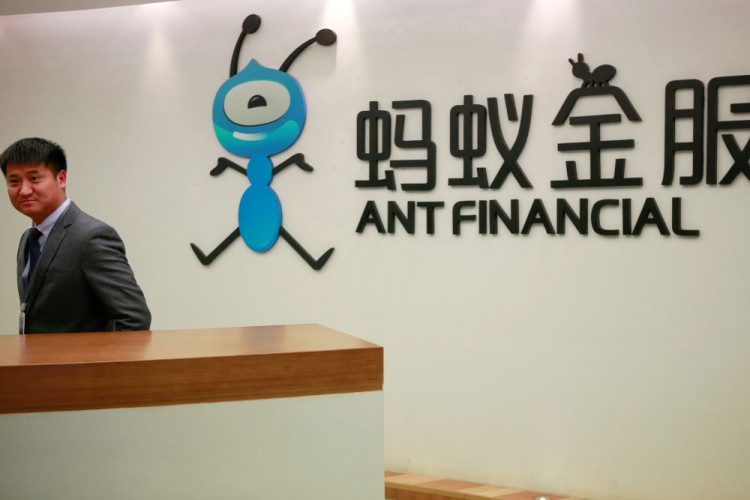Alibaba-backed financial technology company Ant Group will be the world's largest initial public offering, analysts told Business Times on Tuesday.
"When you look at what Ant has been able to achieve it's very difficult to overstate the impact it has had on China's financial ecosystem," Singapore-based founder of market research group Kapronasia, Zennon Kapron, told Business Times on Tuesday.
Ant Group received the green light from Hong Kong's stock exchange Monday - setting the stage for selling at least 10% of its shares. Ant is targeting a more than $200 billion valuation in a $35 billion public offering that will dwarf Saudi Arabian Oil Co.'s $29.4 billion initial public offering in December.
In the last year, profits at the company increased more than 1,000% to reach 21.9 billion yuan ($3.6 billion) on 72.5 billion yuan of revenue in the first half of 2020, according to the prospectus filed with the Hong Kong Stock Exchange.
Ant, parent company of digital payments platform Alipay, filed for a dual listing in August. It will be the first company to list on Shanghai's STAR market and the HKEx simultaneously.
The mainland technology-concentrated bourse took 24 days to approve Ant's application. It took weeks for Hong Kong regulators to give the go ahead after waiting for China Securities Regulatory Commission to sign off.
Analysts say the valuation sought by Ant is within reach, although "the valuation itself is leaning to the higher side of expectations and there is talk of a larger float," senior Bernstein analyst Kevin Kwek said in an email to Business Times.
Alipay, the financial technology arm of Jack Ma's Alibaba e-commerce empire, was rebranded as the Ant Group in 2014. Ant's business model has evolved from a merchant payments company to a lending app and insurance broker.
Credit products surpassed digital payments as the largest contributor to Ant's income in the past 12 months - accounting for nearly 40% of revenue in the year ended June 30.
"Demand is there, especially for the smaller ticket underserved," Kwek said, noting that Ant has yet to get underfoot of regulators.
Meanwhile, Ant's collaboration with nearly 90 brokers has made its online insurance service the largest in China in terms of premiums generated, according to researchers at Oliver Wyman.
Tapping Into The "Little Guy" Investor Base
Consumers and small- and medium-sized enterprises are the main users of Ant's credit and insurance services. They are targeted by Ant as potential investors in its initial public offering through five mutual funds on Alipay.
The funds will invest in the initial public offering, giving more retail investors a slice of the pie than a standard retail tranche via the stock exchange.
"Ant's ethos since its founding has been helping the little guy," Kapron said. "The fact that it is making it accessible to retail investors through the funds on the platform is...unique, but not necessarily surprising."
Even though Ant has allowed more retail investors to buy shares, the listing will undoubtedly be oversubscribed, analysts said.
China regulators delayed the listing process because of a potential conflict-of-interest investigation over Ant's allocation of shares to mutual funds. Approval for the initial public offering was ultimately given - but Alipay remains the only third-party channel for retail investors to buy into mutual funds investing in the initial public offering.
The decision not to release a retail tranche of shares on the HKEX shows how Ant is opening the floor to smaller investors and paying homage to everyday consumers - amounting to more than 1 billion annual users.
The company has more than 80 million active merchants each month and Alipay accounted for 26 billion yuan in revenue for Ant in the first six months of 2020.
Achieving this level of usage is hard to replicate in other countries, Bernstein's Kwek said. "You need Alibaba's dominance in e-commerce alongside strength in payments. Few countries have this combination to give you the kind of customers and insights required."
Growing Overseas
Ant's listing is a potential springboard to empire, as analysts estimate roughly 10% of proceeds will go to fueling growth overseas. While Alipay dominates the domestic market, financial filings reveal its feeble international reach.
Mainland users of the phone app made approximately 118 trillion yuan in transactions on the platform in the 12 months ending June 30, 2020, according to Ant's prospectus. In the same time period, international users racked up a total payment value of 622 billion yuan - making up 0.5% of annual total payment value.
Ant applied for a digital banking license in Singapore earlier this year, while partnering or investing in a variety of e-wallet startups across the rest of Southeast Asia. These include Dana in Indonesia, Ascend Money in Thailand and Mynt in the Philippines.
It remains to be seen whether Ant can adapt its core offering to suit overseas markets, doing abroad what companies ranging from Uber to Microsoft failed to do in China.
"Ant has seen a number of U.S. and foreign tech companies come to China and fail," Kapron said. "The challenge now is to see if Ant has learned the lessons from that as it expands abroad."
Earlier this month, U.S. senator Marco Rubio suggested just that - telling Reuters that "the [Trump] administration should take a serious look at the options available to delay Ant Group's initial public offering."
But these efforts would be futile, given Ant's light footprint stateside. "Ant's technology is home grown and international contributions are low," said Kwek.
"The U.S. represents a very small fraction of the Ant Group revenue stream," Kapron added, noting that the company derives just 5% of its revenue from overseas sources, of which the American market is negligible.





